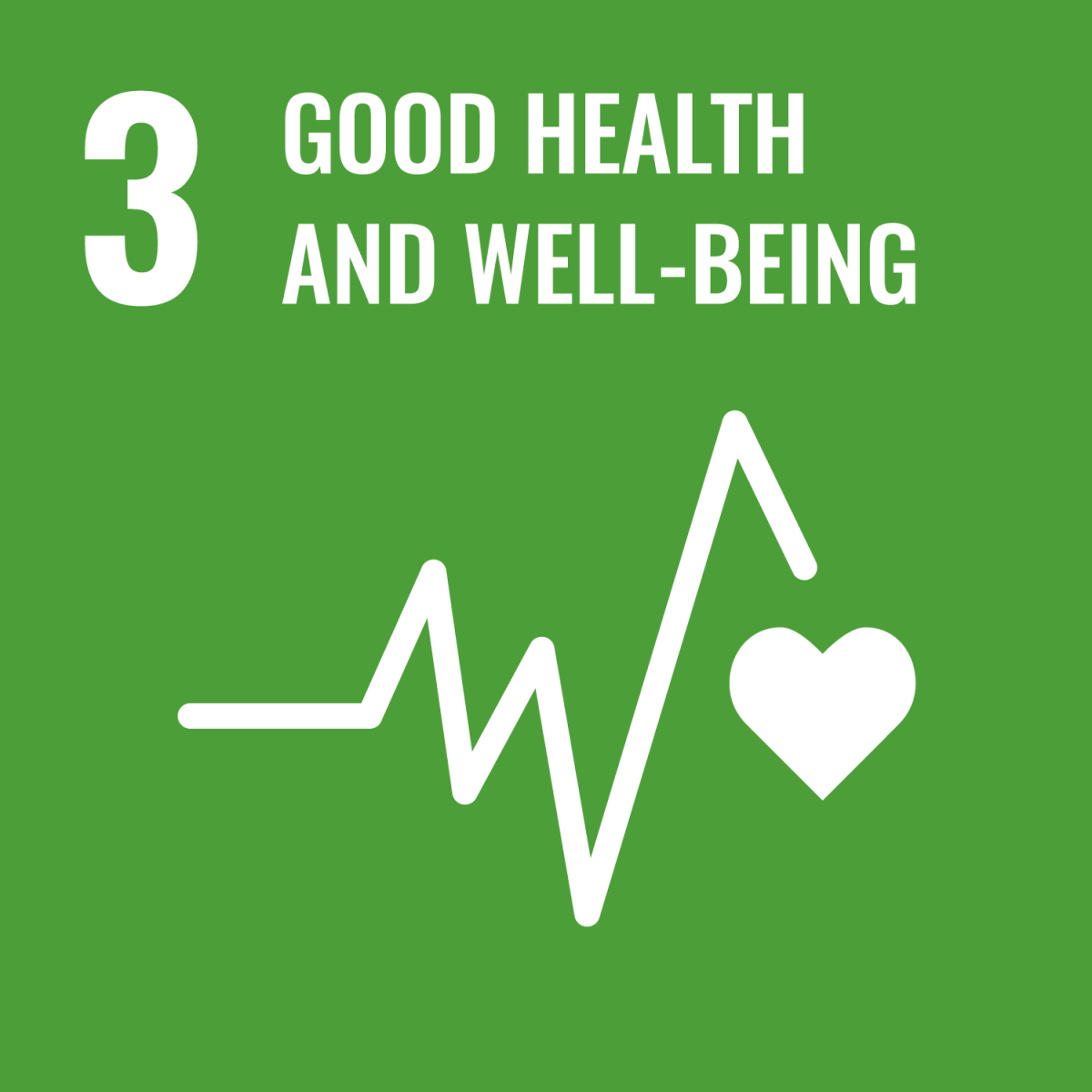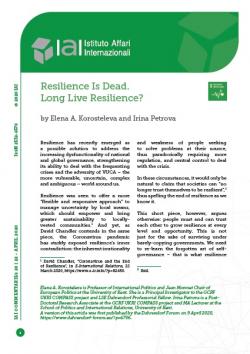Resilience Is Dead. Long Live Resilience?
Resilience Is Dead. Long Live Resilience?
Elena A. Korosteleva and Irina Petrova*
Resilience has recently emerged as a possible solution to address the increasing dysfunctionality of national and global governance, strengthening its ability to deal with the frequenting crises and the adversity of VUCA – the more vulnerable, uncertain, complex and ambiguous – world around us.
Resilience was seen to offer a more “flexible and responsive approach” to manage uncertainty by local means, which should empower and bring greater sustainability to locally-vested communities.[1] And yet, as David Chandler contends in the same piece, the Coronavirus pandemic has starkly exposed resilience’s inner contradiction: the inherent irrationality and weakness of people seeking to solve problems at their source, thus paradoxically requiring more regulation, and central control to deal with the crisis.
In these circumstances, it would only be natural to claim that societies can “no longer trust themselves to be resilient”,[2] thus spelling the end of resilience as we know it.
This short piece, however, argues otherwise: people must and can trust each other to grow resilience at every level and opportunity. This is not just for the sake of surviving under barely-copying governments. We need to re-learn the forgotten art of self-governance – that is what resilience really is about –, as the only way to allow complex “self-referential” social systems to find their own state of equilibrium, to adapt and transform.[3]
The true corollary of this pandemic brings the end of resilience as we know it – as a “smoke screen for neoliberal cost-cutting”[4] – while at the same time, prompting its rebirth as a human effort centred on self-organisation to withstand the (real) crisis of governance.
Against the backdrop of often-inadequate interventionist approaches (primarily in the international development and peacebuilding domains), resilience emerged as a new governance paradigm. Drawing on complexity theory, resilience-thinking highlighted that political processes are complex (inputs do not directly define outputs) and nonlinear (missing causality), which results in uncertainty and the inability to programme desired policy outcomes in advance, and hence to effectively govern top-down.[5]
The resilience approach naturally shifted attention from international and state actors and their predefined development policies to local actors, directly zooming into a problem, because in a complex world these can only be dealt with via bottom-up means that begin at the source.
Resilience-thinking refers to the ability of people or a society to self-organise, drawing on its local strength and knowledge of available resources, and more importantly, on their hope for a better future.[6] This kind of thinking calls for a re-examining of contemporary means of governance[7] and how we use our finite natural resources in the era of the Anthropocene. Moreover, it refocuses attention on how we can empower “the local” – people with their emotions and collective aspirations for “good life” – to be more in charge of their destiny, especially when managing complexity.
This novel approach to governance quickly proliferated in the discourse of major international organisations, from the UN to the European Union and beyond. Notions such as “partnership”, “bottom-up engagement” and “local ownership” have thus emerged as a way to make global/local interactions more effective and sustainable.[8]
Yet, responses to the COVID-19 pandemic triggered profound criticism of resilience as a governance mode. On an individual level, people are said to be simultaneously a source of threat and a subject to be secured. People have proven to be irrational and vulnerable, which contradicts the major assumption behind resilience-thinking, that the ability of the “human” and the community is to provide the best response to crises.
Critics have gone as far as to claim that “our society no longer believes in anything but bare life”,[9] giving up relationships, friendships, values and ambitions for protection and security. The observed processes of closing, withdrawing and “removing ourselves from the collectivity that we might harm despite our best intentions”[10] are opposed to resilience because “People cannot be trusted. People do not know better.”[11]
In line with this, at the state level, an unprecedented set of measures have been rolled out restricting basic human rights, such as freedom of movement and assembly – people are “trapped at home while outside there is only the extension of police powers and the din of ambulances”.[12] Governments are taking back control, reviving nationalism, borders and, above all, the 19th century state[13] – the state that governs, protects and regulates the human. Observing these responses to the pandemic, critics concluded that resilience might have exhausted its potential.
In his timely article, Pol Bargués has noted that “resilience is ‘always more’”.[14] This means there is much potential for resilience that we have yet to discover, both as a quality and an analytic of governance, to find more simple and adequate solutions locally, inside-out and bottom-up.[15] Resilience therefore is still an untapped resource.
Contrary to the mounting criticism and rejection of resilience,[16] the COVID-19 pandemic has paradoxically demonstrated the opposite – people have shown incredible resourcefulness and grit, as individuals and communities, in an effort to resist the virus and survive the crisis.
If we cannot “keep calm and carry on” in a normal pre-crisis way, we would seek and find other ways to be resilient, and support each other at every level of society. And this is what seems to be emerging in Britain and across Europe today: the true rise of civil society, which Margaret Thatcher thought never existed, and which prime minister Boris Johnson called on to mask the inadequacies of his government’s response to the crisis.[17]
On a personal level, people took resilience “underground”, into their homes, turning every household into a bastion of self-isolation and determination to survive the crisis and continue “business (almost) as usual”. This involved incredible feats by citizens: moving work online, reorganising homes to accommodate family needs, self-schooling children, looking after the vulnerable, feeding, shopping and keeping everyone healthy and entertained – all for the purpose of saving lives. Psychology studies analysing the current public response to the pandemic across Europe, concluded that “resilience is our default mode”.[18]
On a community level, new partnerships emerge turning university labs and schools across Europe into science factories to find an antidote and help the frontline medical staff;[19] supermarkets introduce special hours for medical staff, and neighbours look after the vulnerable – all to stay resilient and beat the crisis with human grit. This is observable worldwide, “turn[ing] us into caring neighbours”.[20]
The state too seems to be acting as one living system, putting measures in place to protect its citizens, combat the spread of infection and enforce order as necessary, having the police patrolling the streets and the army on standby. And yet, society is on guard too, watching the state, making sure it does not overstep, keeping tabs on government actions via social media.[21]
So, who are the weak and irrational, allegedly bringing the crisis onto themselves and requiring the state to take back control? As societal responses across Europe attest, those, the resilient, are still standing tall and vigilant, correcting the initial (emotional) responses to the crisis as necessary, and (re)balancing the system to its rightful equilibrium. Every crisis brings both danger and opportunity. While the Coronavirus pandemic still ravages, resilience, as a human response, brings out the best in us, and the system back to a new normality.
The Coronavirus crisis has spelt the end of resilience as we know it. Even the more radical protagonists of resilience have agreed that it indeed failed to fulfil its promise, claiming that “when facing a global pandemic, even this reactive, flexible and community-led approach to resilience is not an option”,[22] because people are required to withdraw rather than to collectively self-organise to tackle the pandemic.
This piece has argued that while the neo-liberal framing of resilience requiring central control is certainly dead, what we are observing today is the rise of a new resilience paradigm premised on humanity, grit and a collective fight for a better tomorrow. This is what this crisis has brought to light: not just our ability to cope and bounce back, but to withdraw and still be resilient, isolated but still an active part of a community, caring for everyone at every level.
In this and many other modes of individual and collective responses to the COVID-19 pandemic, resilience lives on!
* Elena A. Korosteleva is Professor of International Politics and Jean Monnet Chair of European Politics at the University of Kent. She is a Principal Investigator to the GCRF UKRI COMPASS project and LSE Dahrendorf Professorial Fellow. Irina Petrova is a Post-Doctoral Research Associate at the GCRF UKRI COMPASS project and MA Lecturer at the School of Politics and International Relations, University of Kent.
A version of this article was first published by the Dahrendorf Forum on 9 April 2020, https://www.dahrendorf-forum.eu/?p=6706.
[1] David Chandler, “Coronavirus and the End of Resilience”, in E-International Relations, 25 March 2020, https://www.e-ir.info/?p=82450.
[2] Ibid.
[3] Niklas Luhmann, Essays on Self-Reference, New York, Columbia University Press, 1990.
[4] David Chandler, “Coronavirus and the End of Resilience”, cit.
[5] Daniel Clausen, “Crude Thinking — 7 Ways of Dealing with the Complex in IR”, in E-International Relations, 29 January 2016, https://www.e-ir.info/?p=61292.
[6] Elena A. Korosteleva and Trine Flockhart (eds), “Resilience in EU and International Institutions”, Special Issue in Contemporary Security Policy, Vol. 41, No. 2 (February 2020), p. 153-360, https://www.tandfonline.com/toc/fcsp20/41/2.
[7] Trine Flockhart, “Is This the End? Resilience, Ontological Security, and the Crisis of the Liberal International Order”, in Contemporary Security Policy, Vol. 42, No. 2 (February 2020), p. 215-240.
[8] Irina Petrova and Laure Delcour, “From Principle to Practice? The Resilience–Local Ownership Nexus in the EU Eastern Partnership Policy”, in Contemporary Security Policy, Vol. 42, No. 2 (October 2019), p. 336-360, https://doi.org/10.1080/13523260.2019.1678280.
[9] Giorgio Agamben, “Clarifications”, in An und für sich, 17 March 2020, https://wp.me/p2IRQ-70u.
[10] Andreas Philippopoulos-Mihalopoulos, “Covid: The Ethical Disease”, in Critical Legal Thinking, 13 March 2020, https://criticallegalthinking.com/?p=27818.
[11] David Chandler, “Coronavirus and the End of Resilience”, cit.
[12] Bruno Latour, “Is This a Dress Rehearsal?”, in In the Moment. Critical Inquiry Blog, 26 March 2020, https://wp.me/p1MkGj-lQ.
[13] Ibid.
[14] Pol Bargués-Pedreny, “Resilience Is ‘Always More’ Than Our Practices: Limits, Critiques, and Skepticism about International Intervention”, in Contemporary Security Policy, Vol. 42, No. 2 (February 2020), p. 263-286.
[15] Elena A. Korosteleva, “Reclaiming Resilience Back: A Local Turn in EU External Governance”, in Contemporary Security Policy, Vol. 42, No. 2 (February 2020), p. 241-262, https://doi.org/10.1080/13523260.2019.1685316.
[16] Jan Pospisil, “The Virus That Ends Us: On the Ethics of Withdrawal and Affirmation”, in CDP Policy Blog, 25 March 2020, https://wp.me/p8zVnv-1VB.
[17] Matt Honeycombe-Foster, “Boris Johnson Says UK’s Response to Coronavirus Shows There Is ‘Such a Thing as Society’”, in Politics Home, 30 March 2020, https://www.politicshome.com/news/article/boris-johnson-says-coronavirus-response-shows-there-is-such-a-thing-as-society-in-rebuke-to-margaret-thatcher.
[18] Noam Shpancer, “Lessons from Coronavirus: We Are More Resilient Than We Feel”, in Psychology Today, 29 March 2020, https://www.psychologytoday.com/us/node/1142132.
[19] “Mercedes and UCL Engineers Develop Covid-19 Breathing Aid”, in The Engineer, 30 March 2020, https://www.theengineer.co.uk/?p=381832; St Edmund’s School, “Ms Florence & Mr Anderson Used Their Design and Technology Skills Yesterday to Laser Cut a Batch of PPE for Frontline NHS…”, Twitter post, 6 April 2020, https://twitter.com/StEdsCanterbury/status/1247068578601480192.
[20] George Monbiot, “The Horror Films Got It Wrong. This Virus Has Turned Us into Caring Neighbours”, in The Guardian, 31 March 2020, https://gu.com/p/dhy82.
[21] José Maurício Domingues, “Coronavirus, Risk Society and the Return of the State”, in OpenDemocracy, 2 April 2020, https://www.opendemocracy.net/en/democraciaabierta/coronavirus-risk-society-and-return-state.
[22] David Chandler, “Coronavirus and the End of Resilience”, cit.

-
Dati bibliografici
Roma, IAI, aprile 2020, 5 p. -
In:
-
Numero
20|22




